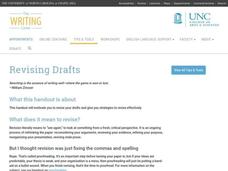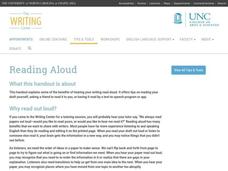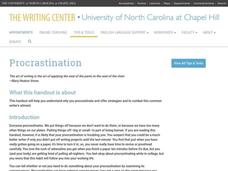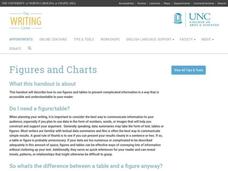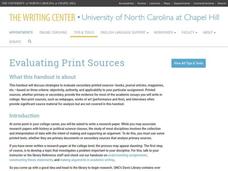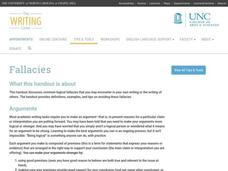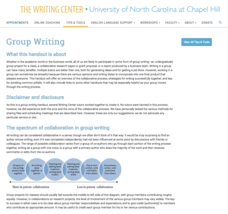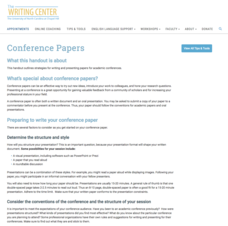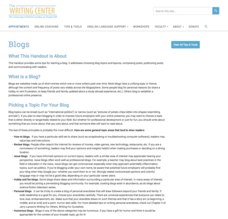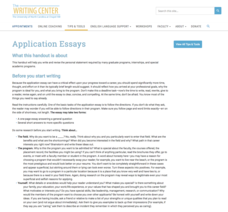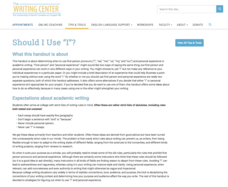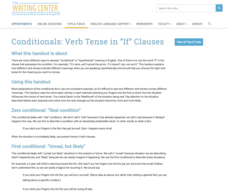University of North Carolina
Statistics
Let's see you back it up! As shown in the 18th handout in the Writing the Paper series of 24 lessons from UNC, statistics help form an effective argument. The handout discusses how to analyze a source and break down the data to ensure it...
University of North Carolina
Revising Drafts
Don't simply proofread ... revise instead! Revising drafts is the topic of the 17th handout in UNC's Writing the Paper series of 24 lessons. Writers discover the importance of revision, as well as steps to follow during the process.
University of North Carolina
Reading Aloud
Warning: reading your paper aloud may cause bystanders to think you're talking to yourself. However, as the 14th installment of 24 in the Writing the Paper series from UNC explains, it is one of the best strategies for revision. Through...
University of North Carolina
Procrastination
Inevitably, whenever you give an assignment, at least one person won't start until the last minute. As the 13th handout in the 24-part Writing the Paper series explains, procrastination sometimes brings consequences. It breaks down...
University of North Carolina
Introductions
You never get a second chance to make a first impression. According to the 11th handout in the 24-part Writing the Paper series, that's why writing a strong introduction is so important. The handout offers strategies for crafting...
University of North Carolina
Figures and Charts
Sometimes words aren't the best way to get information across to the reader. The eighth handout in the 24-part Writing the Paper series describes different type of figures and charts to display complex information in a paper....
University of North Carolina
Evaluating Print Sources
Not all sources are created equal, so how do you evaluate them? Writers learn how to evaluate print sources based on elements such as audience, tone, and argument in the sixth handout of 24 in the Writing the Paper series from the...
University of North Carolina
Fallacies
All teacher workrooms contain a coffee maker, therefore all teachers must be addicted to coffee. That sentence represents a logical fallacy (although it may be true from some), a topic the seventh installment in the 24-part Writing the...
University of North Carolina
Audience
Challenging pupils' perspectives by having them walk in the shoes of the reader. An informative resource discusses how to identify an audience and anticipate their needs before writing an upcoming argumentative essay.
University of North Carolina
Argument
What elements make up a successful argument? A helpful resource describes aspects of an argument such as the claim, evidence, counterargument, and audience. Perfect as an individual assignment for a flipped lesson or collaborative work,...
Carolina K-12
EU Movement Role Play
Using role play, a graphic organizer, and discussion, your class members will compare and contrast the movement of people and goods between countries in the European Union before and after the organization was established. This is a...
University of North Carolina
Group Writing
Two heads are better than one, especially during the writing process. Sometimes, scholars benefit from participating in group writing assignments, as one of the handouts in a series on specific writing assignments outlines. The process...
University of North Carolina
Business Letters
A business letter may be the key receiving a job offer or making a major deal. A writing handout, part of a series of handouts on specific types and styles, shares some of the key components involved with writing a business letter. The...
University of North Carolina
Scientific Reports
IMRAD isn't text-speak for I'm cool. It's actually the format for scientific reports. As part of a larger series on specific writing assignments, an informative handout explains the nuts and bolts of writing a lab report. First, however,...
University of North Carolina
Letters of Recommendation
Letters of recommendation play a key role in the college admissions process. A handout on the topic, part of a series on specific writing assignments, helps applicants through the process of choosing recommenders and requesting a letter....
University of North Carolina
Conference Papers
In the world of academia, conference papers and presentations play a big role. It's through conference papers that professors and graduate assistants share their research with others in the field. A handout on conference papers, part of...
University of North Carolina
Curricula Vitae (CVs) versus Resumes
The term curricula vitae might sound more sophisticated than the term resumes, but that doesn't mean it's the preferred document to send to potential employers. As explained in a handout on curricula vitae (CV) versus resumes, part of a...
University of North Carolina
Blogs
The blogosphere may be overwhelmed with content, but there's still room for unique points of view. Creating a blog that stands out, however, is the bigger challenge. A handout on blogs, part of a series of handouts on specific writing...
University of North Carolina
Application Essays
There's a lot riding on good writing! Often, an application essay is the difference between acceptance and rejection. As part of a series on specific writing assignments and contexts, a handout helps scholars craft the perfect personal...
University of North Carolina
Should I Use “I”?
Despite the formal nature of academic writing, personal pronouns frequently appear in high school and college papers. While your first instinct may be to cross them out, sometimes it's okay to use them, an idea covered in a handout that...
University of North Carolina
Conditionals: Verb Tense in “If” Clauses
"If you give a mouse a cookie, then he's going to ask for a glass of milk." These iconic words from Laura Numeroff's classic tale offer a great example of conditionals, a topic covered in the handout as part of a larger writing series...
University of North Carolina
Relative Clauses
Knock, knock. Who's there? To. To who? No! To whom. Knowing when to use who versus whom is just one of the many topics covered on a handout about relative pronouns. Writers discover how to incorporate words such as whose, that, which,...
University of North Carolina
Brainstorming
Did you just hear thunder? Nope, you heard the sound of another kind of storm—a brainstorm! A handout teaches writers about different kinds of brainstorming and provides options for them to try when beginning to write their own papers....
University of North Carolina
The Mini Page: Ben Franklin from A to Z
Get the skinny on Benjamin Franklin with a newspaper that offers interesting facts including his background, political contributions, inventions, as well as fellow inventors from his time. After reading, scholars take part in activities...



